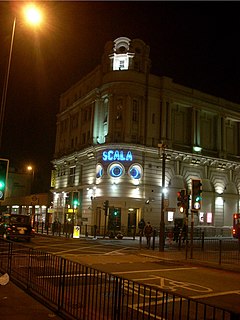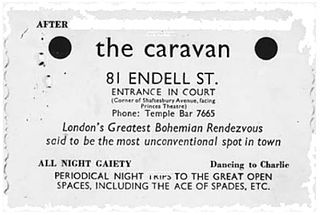Related Research Articles

Soho is an area of the City of Westminster, part of the West End of London. Originally a fashionable district for the aristocracy, it has been one of the main entertainment districts in the capital since the 19th century.

A gay bar is a drinking establishment that caters to an exclusively or predominantly lesbian, gay, bisexual, and transgender (LGBT) clientele; the term gay is used as a broadly inclusive concept for LGBT and queer communities.

The London Astoria was a music venue, located at 157 Charing Cross Road, in London, England.

The Fridge was a nightclub in the Brixton area of South London, England, founded by Andrew Czezowski and Susan Carrington, who had run the Roxy during punk music's heyday in 1977. It was originally started in 1981, in a small club at 390 Brixton Rd, and in 1982 above Iceland in Brixton Road with a radical decor that included beat-up ice boxes and artificial dead cats hanging from its ceiling. Early guest DJs included Keith Barker-Main, later a lifestyle journalist and social commentator. It claims to have been the first British club to have such innovations as video screens and a chill out lounge. The Fridge was at the heart of the early 80s New Romantic movement, and booked such acts as Eurythmics and the Pet Shop Boys before they were well known and drew famous faces such as Boy George, Frankie Goes to Hollywood, Magenta Devine, as well as Marc Almond and Grace Jones, who also performed there.

The London Trocadero was an entertainment complex on Coventry Street, with a rear entrance in Shaftesbury Avenue, London. It was originally built in 1896 as a restaurant, which closed in 1965. In 1984, the complex reopened as an exhibition and entertainment space, which operated until 2014. Part of the building was opened as a hotel in 2020.

Scala is a former cinema turned nightclub and live music venue in Pentonville Road, London, England, near King's Cross railway station.

The Marquee Club was a music venue first located at 165 Oxford Street in London, when it opened in 1958 with a range of jazz and skiffle acts. Its most famous period was from 1964 to 1988 at 90 Wardour Street in Soho, and it finally closed when at 105 Charing Cross Road in 1996, though the name has been revived unsuccessfully three times in the 21st century. It was always a small and relatively cheap club, located in the heart of the music industry in London's West End, and used to launch the careers of generations of rock acts.

Coventry Street is a short street in the West End of London, connecting Piccadilly Circus to Leicester Square. Part of the street is a section of the A4, a major road through London. It is named after the politician Henry Coventry, secretary of state to Charles II.

Heaven is a superclub in Charing Cross, London, England. It has a long association with London's LGBT scene and is home to long-running gay night G-A-Y. The club is known for Paul Oakenfold's acid house events in the 1980s, the underground nightclub festival Megatripolis, and for being the birthplace of ambient house.

The Astoria 2, subsequently known as the LA2 then the Mean Fiddler, was a nightclub at 165 Charing Cross Road in London, England.

The Raymond Revuebar (1958–2004) was a theatre and strip club at 11 Walker's Court, in the centre of London's Soho district. For many years, it was the only venue in London that offered full-frontal, on-stage nudity of the sort commonly seen in other cities in Europe and North America. Its huge brightly lit sign declaring it to be the "World Centre of Erotic Entertainment" made the Revuebar a local landmark.

GaydarRadio is a podcast on Mixcloud streaming service, which used to be a British digital radio station for gay men, lesbians and gay friendly people, on DAB multiplexes in London and Brighton and also online. It was broadcast 24 hours a day, with live programming from 5am to midnight during the week, 7am to midnight at weekends.
XXL was a gay nightclub in London and Birmingham which catered to the bear sub-group. The club was founded by Mark Ames and his then partner David Dindol in 2000. They separated in 2005, after which Mark purchased his ex-partner's share of the club. It was the largest dedicated "bear" venue in the United Kingdom and the world. It was not just the bear scene's longest-running weekly disco but London's too, having not missed a night in over 16 years.

A nightclub, music club, or club, is an entertainment venue and bar that usually operates late into the night. A nightclub is generally distinguished from regular bars, pubs, or taverns by the inclusion of a stage for live music, one or more dance floor areas and a DJ booth, where a DJ plays recorded music. The upmarket nature of nightclubs can be seen in the inclusion of VIP areas in some nightclubs, for celebrities and their guests. Nightclubs are much more likely than pubs or sports bars to use bouncers to screen prospective clubgoers for entry. Some nightclub bouncers do not admit people with informal clothing or gang apparel as part of a dress code. The busiest nights for a nightclub are Friday and Saturday night. Most clubs or club nights cater to certain music genres, such as house music or hip hop. Many clubs have recurring club nights on different days of the week. Most club nights focus on a particular genre or sound for branding effects.

The Birmingham Gay Village is an LGBT district or "gaybourhood" next to the Chinese Quarter in Birmingham city centre, centred along Hurst Street, which hosts many LGBT-friendly businesses. The village is visited by thousands of people every week and has a thriving night life featuring clubs, sports bars, cocktail bars, cabaret bars and shops, with most featuring live entertainment including music, dancing and drag queens.
The Players' Theatre was a London theatre which opened at 43 King Street, Covent Garden, on 18 October 1936. The club originally mounted period-style musical comedies, introducing Victorian-style music hall in December 1937. The threat of World War II German bombing prompted a move in October 1940 to a basement at 13 Albemarle Street, Piccadilly and then after the cessation of hostilities, to Villiers Street, Charing Cross, opening on 14 February 1946.

The Pheasantry, 152 King's Road, Chelsea, London, is a Grade II listed building that was home to a number of important figures in 1960s London and a small music venue in the 1970s where a number of bands were able to play their first gigs.

The Caravan Club was a gay and lesbian-friendly club in the basement of 81 Endell Street, London, that was the subject of a sensational court case in 1934. Following a police raid, the club's owners were accused of "exhibiting to the view of any person willing to pay for admission lewd and scandalous performances". The Caravan Club was one of a number of similar venues in London's West End in the inter-war years.

The Rio Cinema is a Grade II listed independent Art Deco cinema in east London. It is a popular independent cinema located on Kingsland High Street in Dalston, with a history stretching back over 100 years. The Rio added a second screen in the unused basement space in December 2017.

The Grand is a Grade II listed building on St John's Hill, near Clapham Junction in Battersea. It was designed by Earnest Woodrow and was first opened in 1900 as The New Grand Theatre of Varieties.
References
- 1 2 3 4 "Palm Court Cinema in London, GB - Cinema Treasures". cinematreasures.org. Retrieved 26 August 2017.
- ↑ "Mark Birley". telegraph.co.uk. Retrieved 26 August 2017.
- ↑ Brian Kingcome, "A Willingness to Die," Tempus Publishing Ltd, May 1 1999; also available in Kindle edition.
- 1 2 "Dancing till break of dawn". standard.co.uk. Retrieved 26 August 2017.